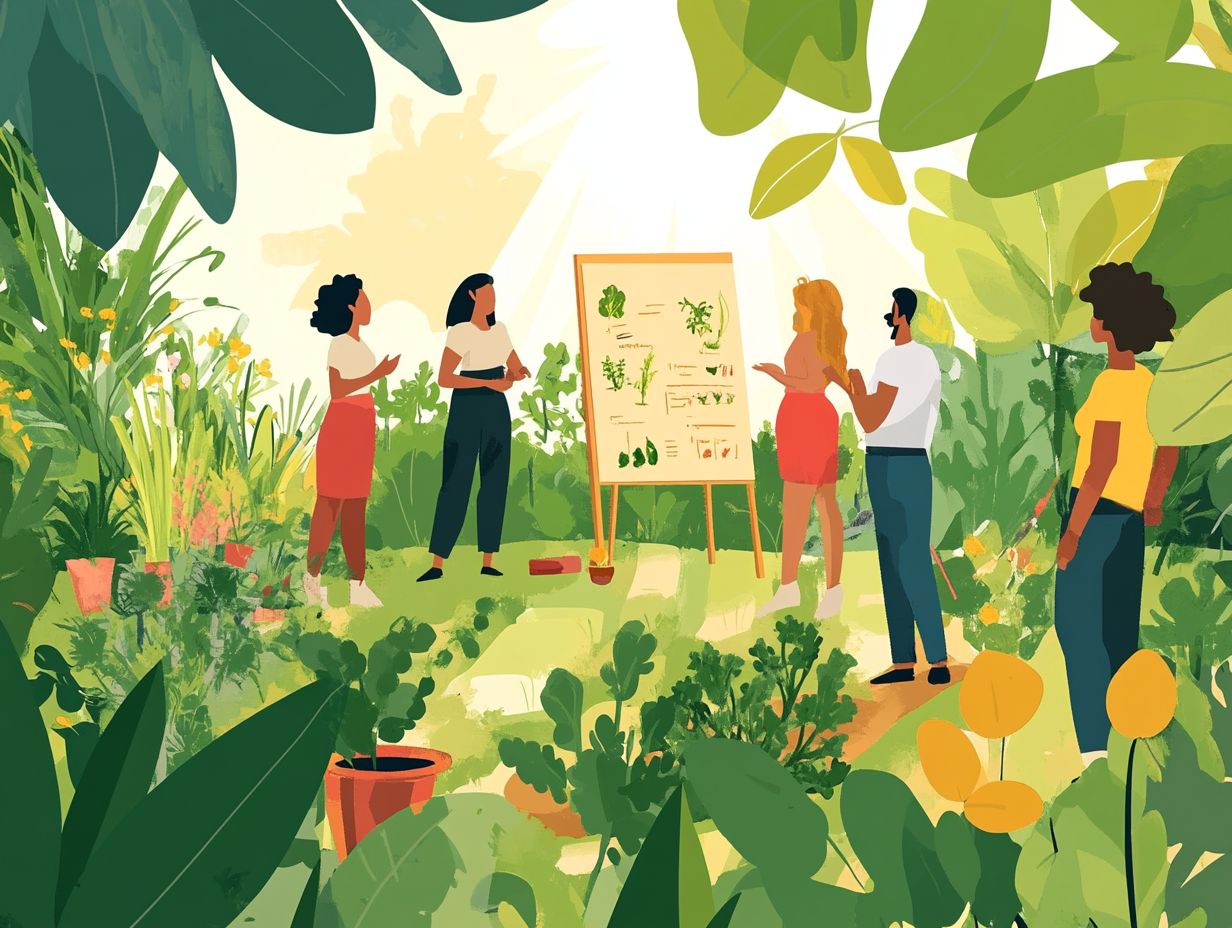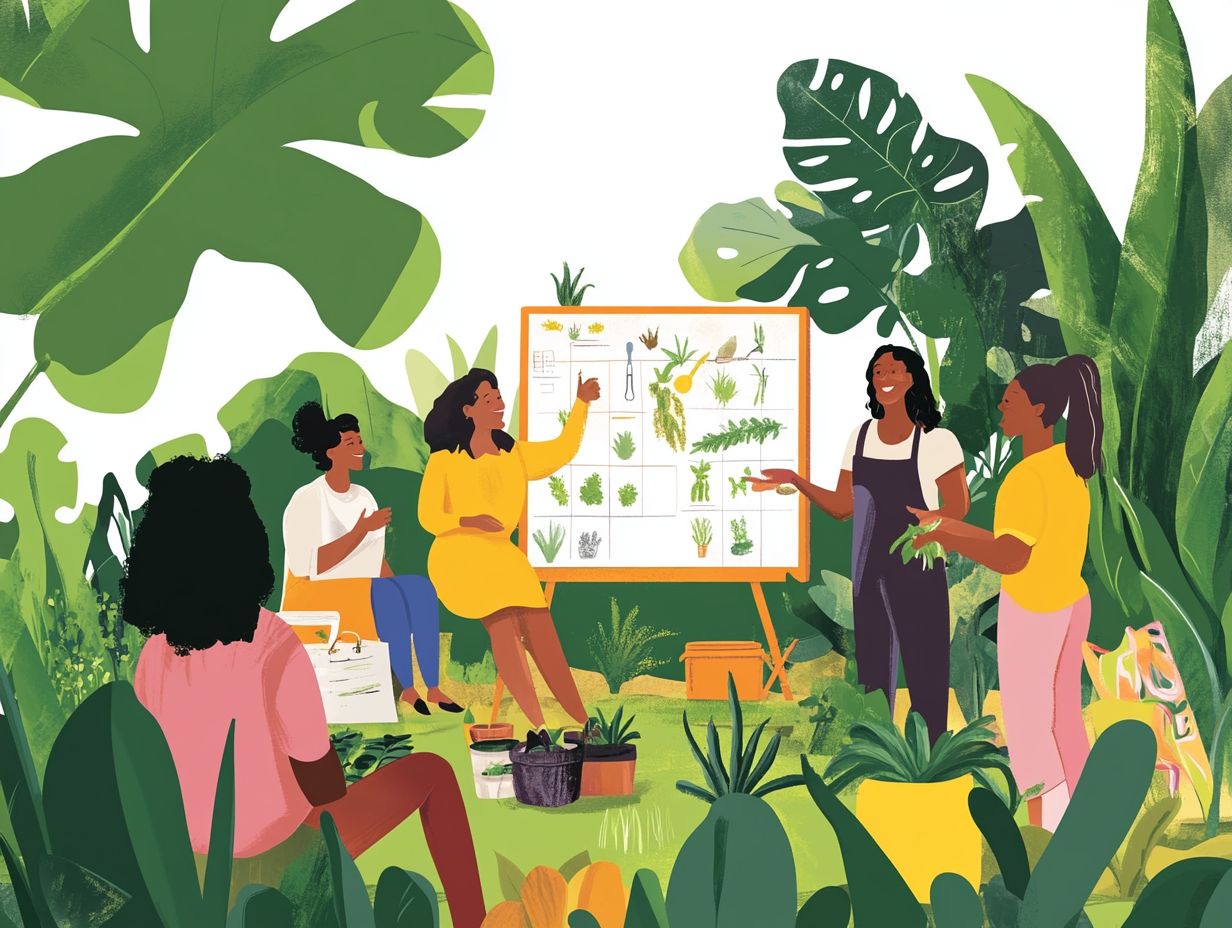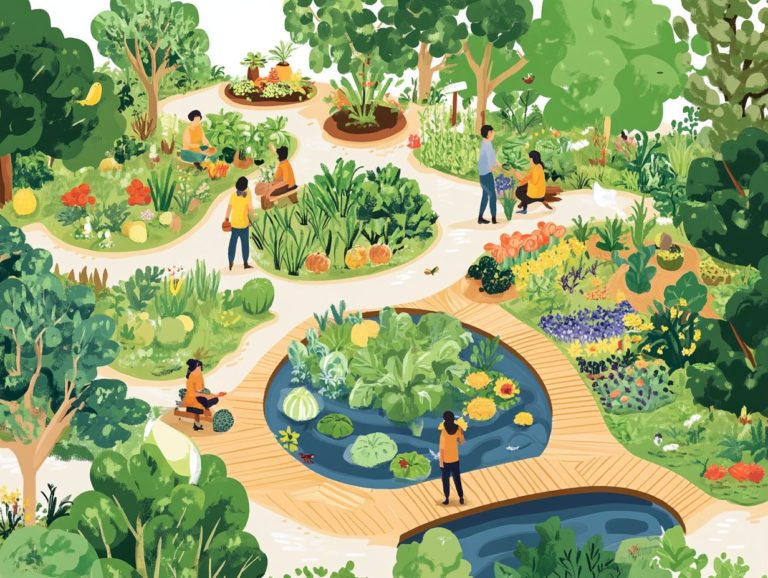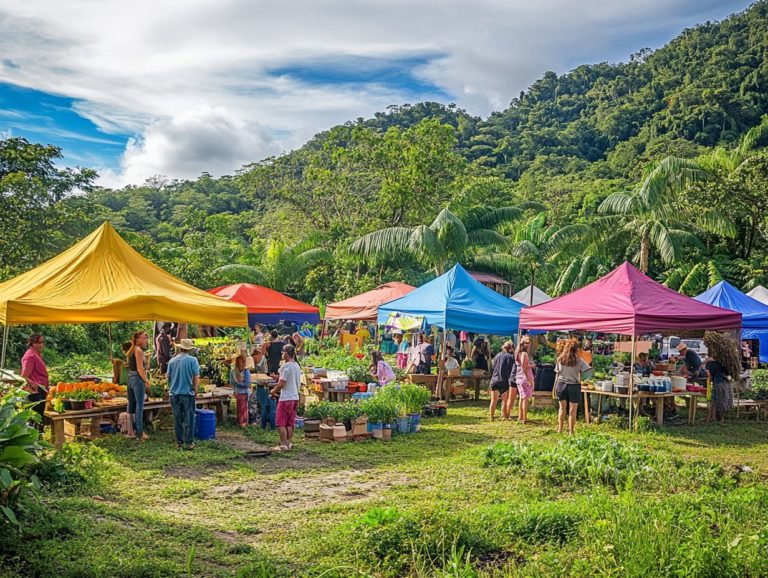74. How to Develop Community Leadership in Permaculture
In the realm of permaculture, community leadership is crucial for creating strong ecosystems and cultivating sustainable practices.
This exploration delves into the essential qualities of effective leaders and the development of key leadership skills. It also highlights the significance of empowering community members. By fostering supportive relationships and addressing conflicts, you can create inclusive environments where every individual feels valued.
You ll discover how to weave permaculture principles into your leadership approach to ensure enduring success. Ready to transform your community? Prepare to uncover the transformative power of community leadership in the world of permaculture!
Contents
- Key Takeaways:
- The Importance of Community Leadership in Permaculture
- Developing Leadership Skills in Permaculture
- Empowering Community Members to Become Leaders
- Creating a Supportive and Inclusive Community
- Implementing Sustainable Practices in Community Leadership
- Frequently Asked Questions
- What is community leadership in permaculture?
- Why is it important to develop community leadership in permaculture?
- How can I develop my own community leadership skills in permaculture?
- What are some benefits of having strong community leadership in permaculture?
- How can I encourage others in my community to become leaders in permaculture?
- Can community leadership in permaculture be developed in urban areas?
Key Takeaways:

- Unlock the secrets to effective community leadership!
- Community leaders play a crucial role in promoting sustainable practices in permaculture.
- Effective community leaders possess key qualities such as empathy, communication, and adaptability.
- Encouraging participation, building relationships, and incorporating permaculture principles are vital in developing community leadership.
The Importance of Community Leadership in Permaculture
Community leadership is essential to the success of permaculture initiatives, as it nurtures robust communities capable of tackling pressing social issues. For those looking to enhance their efforts, exploring resources on how to start a permaculture group in your area can be incredibly beneficial in addressing environmental degradation, economic disparity, and political corruption.
Effective leaders are the heartbeat of intentional communities, championing practices that foster resilience, interdependence, and sustainability.
You can harness collaborative design and a participatory culture to engage community members in transformative processes. This creates a supportive environment that resonates with local needs and aspirations.
Understanding the Role of Community Leaders
Community leaders act as both facilitators and visionaries, guiding intentional communities toward shared goals. They do this with exceptional communication skills and cooperative leadership.
These individuals play a crucial role in building connections among community members. They nurture collaboration that fosters trust and mutual respect.
They articulate a clear vision for progress. This ensures that every voice is heard and valued in discussions.
Community leaders take the initiative to address local issues through community-led initiatives. They promote engagement and sustainable practices that truly resonate with the community’s needs.
Their commitment to transparency and inclusiveness cultivates an environment where collaboration flourishes, ultimately empowering individuals to contribute meaningfully to the shared vision.
Developing Leadership Skills in Permaculture
Developing leadership skills in permaculture is crucial for empowering community members. It cultivates a culture of resilience and sustainability, equipping them to effectively navigate social challenges and learn how to foster a culture of permaculture in your community.
By honing these skills, individuals can inspire collective action and foster a thriving environment where everyone can flourish.
Key Qualities and Traits of Effective Leaders
Effective leaders within intentional communities embody qualities such as empathy, adaptability, and a steadfast commitment to shared values. These traits allow them to cultivate trust and collaboration among members.
These essential traits not only motivate individuals but also create an atmosphere ripe for collective action aimed at social change.
Take Diana Leafe Christian, for example; her empathy serves as a bridge, closing gaps in understanding and fostering inclusion and dialogue among diverse community members.
Similarly, Bill Mollison s adaptive approach to permaculture champions sustainable practices that not only tackle environmental challenges but also strengthen community resilience.
By exemplifying these qualities, effective leaders elevate community engagement. They ensure that social initiatives flourish and contribute to meaningful, lasting transformations.
Effective community leadership paves the way for sustainable growth. Together, we can build a brighter future through collaboration and resilience.
Ways to Develop Leadership Skills

There are many ways for you to develop your leadership skills, such as training programs, community workshops, and outreach initiatives tailored to meet the diverse needs of community members.
Diving into hands-on experiences within permaculture gardens a sustainable farming method that mimics natural ecosystems or community kitchens, which are shared kitchens where people cook together, offers you great opportunities to learn through action. These environments not only promote skill acquisition through practical application but also embody the spirit of grassroots movements and participatory culture, emphasizing collaboration and shared learning.
By immersing yourself in these community-driven initiatives, you gain invaluable insights into sustainable practices and collective problem-solving. This allows you to enhance both your technical abilities and social connections. Ultimately, integrating theory with practice boosts your leadership potential.
Empowering Community Members to Become Leaders
Empowering community members to step into leadership roles is essential for cultivating a participatory culture. This approach values collaboration and addresses local needs while bolstering grassroots movements.
By encouraging individuals to take charge, you create a vibrant community where everyone s voice matters and collective progress thrives.
Involving and Encouraging Participation
Engaging and encouraging participation in community initiatives can pave the way for grassroots change and cultivate stronger connections among community members.
When you feel included and valued in the design processes of your community, you’re more likely to contribute in meaningful ways. Inclusive practices not only invite a variety of perspectives but also ensure that solutions cater to the needs of diverse stakeholders, enhancing your sense of ownership within the community.
Techniques like consensus-building processes and community meetings act as platforms for open dialogue, allowing you to voice your opinions and collaborate on innovative ideas. These gatherings foster trust and create an environment where collective efforts can flourish, reinforcing the bonds among residents while promoting sustainable and effective community development.
Creating a Supportive and Inclusive Community
Fostering a supportive and inclusive community demands deliberate efforts to cultivate relationships and establish trust among members. It also involves adeptly navigating conflicts and challenges as they arise, ensuring that everyone feels valued and heard.
Building Relationships and Trust
Building relationships and trust is crucial in any community, as it enhances dynamics and fosters effective communication among members.
By engaging in collaborative leadership, you can help cultivate a culture of openness and mutual respect. Initiatives like community kitchens do more than just provide nourishing meals; they serve as essential gathering places where individuals connect, share stories, and work together toward common goals.
Local farms offer another layer of interaction, allowing you to grasp the significance of sustainable practices while fostering connections through shared labor and the joy of harvesting fresh produce. These collective experiences weave a rich tapestry of connections, reinforcing the bonds of trust that are vital for a thriving community.
Addressing Conflicts and Challenges

Addressing conflicts and challenges within your community is essential for maintaining harmony and creating a genuine sense of belonging among all members.
By employing effective conflict resolution strategies, you can cultivate an environment where differing perspectives are both acknowledged and respected. Engaging everyone in collaborative processes not only promotes understanding but also gives the power to individuals to contribute to solutions, reinforcing the principle that every voice truly matters.
These strategies are crucial for mitigating misunderstandings and fostering a culture of open dialogue. As a result, your community won t just resolve disputes; it will strengthen its bonds, ensuring that the dynamic interplay of diverse opinions enriches the collective experience.
Implementing Sustainable Practices in Community Leadership
Implementing sustainable practices in community leadership is essential for fostering a resilient and flourishing environment. By aligning with sustainable farming practices that work with nature, you can promote ecological design and enhance the overall well-being of the community.
This approach nurtures the ecosystem and strengthens the bonds among community members, paving the way for a brighter future.
Incorporating Permaculture Principles
Incorporating sustainable farming practices into your approach allows you to cultivate systems that enhance ecological design while promoting fairness and equal opportunities for everyone in the community.
Embrace exciting practices like organic gardening, rainwater harvesting, and composting to transform your community! These initiatives can significantly bolster local food security and reduce dependence on external resources.
Intentional communities, such as EcoVillage in Ithaca, New York, exemplify how shared values centered around sustainability and resilience lead to thriving ecosystems and strengthened social connections.
These successful projects enhance biodiversity and foster collaborative spaces where community members engage in resource management, creating a more robust ecological network that benefits both people and the planet.
Ensuring Long-Term Success and Growth
Ensuring long-term success in community leadership demands strategic planning, active community involvement, and effective funding strategies to support ongoing initiatives.
Sustainable funding is crucial; it provides the financial resources necessary for projects while instilling a sense of security and commitment among stakeholders.
By cultivating strong partnerships and tapping into community resources, you can establish a robust support system that promotes collaboration across various groups.
Outreach initiatives raise awareness and garner support, enabling voices from diverse backgrounds to contribute to the dialogue. This collaborative approach not only secures the funding you need but enriches community projects with a variety of perspectives, driving deeper engagement and amplifying impact.
Frequently Asked Questions
What is community leadership in permaculture?

Community leadership in permaculture refers to the development of individuals within a community who possess the skills, knowledge, and attitude to lead and inspire others towards creating a sustainable and regenerative environment.
Why is it important to develop community leadership in permaculture?
Developing community leadership in permaculture empowers individuals within a community to take ownership and responsibility for creating a sustainable future. It highlights the power of community in permaculture design and creates a strong network of leaders who can work together towards a common goal.
How can I develop my own community leadership skills in permaculture?
To develop your community leadership skills in permaculture, start by educating yourself on sustainable farming practices. Additionally, understanding the role of community in permaculture design can enhance your efforts. Participate in community projects and workshops, and actively seek opportunities to lead and collaborate with others.
What are some benefits of having strong community leadership in permaculture?
Strong community leadership in permaculture leads to a cohesive and resilient community, along with a healthier and more sustainable environment. It promotes a sense of responsibility and empowerment among community members.
How can I encourage others in my community to become leaders in permaculture?
Encourage others to become leaders in permaculture by leading by example and showcasing the positive impact it has on the community and environment. Provide resources and support for those interested in learning more about permaculture and developing their leadership skills.
Can community leadership in permaculture be developed in urban areas?
Yes, community leadership in permaculture can be developed in both urban and rural areas. Permaculture principles apply to any environment, and it is important for individuals to take responsibility for their actions and work towards creating sustainable communities, regardless of their location.
Join us in cultivating a sustainable future! Start by picking one practice to implement in your community today!






